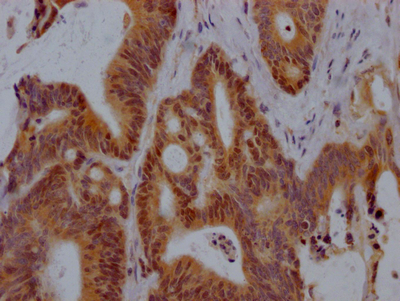ATXN10 Antibody
-
货号:CSB-PA002439GA01HU
-
规格:¥3,900
-
其他:
产品详情
-
Uniprot No.:Q9UBB4
-
基因名:ATXN10
-
别名:Ataxin 10 antibody; Ataxin-10 antibody; ATX10_HUMAN antibody; Atxn10 antibody; Brain protein E46 homolog antibody; E46L antibody; FLJ37990 antibody; HUMEEP antibody; Like mouse brain protein E46 antibody; OTTHUMP00000197383 antibody; SCA10 antibody; Spinocerebellar ataxia 10 antibody; Spinocerebellar ataxia type 10 protein antibody
-
宿主:Rabbit
-
反应种属:Human,Mouse,Rat
-
免疫原:Human ATXN10
-
免疫原种属:Homo sapiens (Human)
-
抗体亚型:IgG
-
纯化方式:Antigen Affinity purified
-
浓度:It differs from different batches. Please contact us to confirm it.
-
保存缓冲液:PBS with 0.1% Sodium Azide, 50% Glycerol, pH 7.3. -20°C, Avoid freeze / thaw cycles.
-
产品提供形式:Liquid
-
应用范围:ELISA,WB,IHC,IF
-
Protocols:
-
储存条件:Upon receipt, store at -20°C or -80°C. Avoid repeated freeze.
-
货期:Basically, we can dispatch the products out in 1-3 working days after receiving your orders. Delivery time maybe differs from different purchasing way or location, please kindly consult your local distributors for specific delivery time.
相关产品
靶点详情
-
功能:Necessary for the survival of cerebellar neurons. Induces neuritogenesis by activating the Ras-MAP kinase pathway. May play a role in the maintenance of a critical intracellular glycosylation level and homeostasis.
-
基因功能参考文献:
- The 19-CGGC-14 shared haplotype was found in 47% of Brazilian and in 63% of Peruvian families. Frequencies from both are statistically different from Brazilian controls but not Quechua controls. The most frequent haplotype in Quechuas, 19-15-CGGC-14-10, is found in 50% of Brazilian and in 65% of Peruvian patients. The ATTCT expansion may have arisen in a Native American chromosome. PMID: 28905220
- Polymorphism in ATXN10 gene is associated with spinocerebellar ataxia type 10. PMID: 28542277
- Inheritance patterns of ATCCT repeat interruptions in spinocerebellar ataxia type 10 expansions of ataxin-10 has been reported. PMID: 28423040
- Single molecule real time sequencing of long tandem nucleotide repeats in spinocerebellar ataxia ATXN10 reveals unique insight of repeat expansion structure in three unrelated patients. PMID: 26295943
- This is the first description of a family with two SCA mutations with affected subjects having a combined SCA2 and SCA10 phenotype. PMID: 25630585
- Inhibition of Aurora B or expression of the S12A mutant renders reduced interaction between Ataxin-10 and polo-like kinase 1 (Plk1), a kinase previously identified to regulate Ataxin-10 in cytokinesis. PMID: 25666058
- Data suggest precursor mRNA for SCA10 (crystalized using two model AUUCU SCA10 repeats) exhibits the following conformation: the two asymmetric RNA molecules are antiparallel to each other and the interaction is stabilized by multiple hydrogen bonds. PMID: 26039897
- the presence of repeat interruptions in SCA10 repeat expansion may have a role in epilepsy phenotype PMID: 24318420
- The SCA10 pentanucleotide repeat expansion was not found among a group of Cypriot ataxia patients. All had 10-19 ATTCT repeats. Controls had 11-20 repeats, with 14 being the most common number. PMID: 23026538
- Plk1 phosphorylates Ataxin-10 on Ser 77 and Thr 82. PMID: 21857149
- The expansion of the attct repeat in intron 9 of atxn10 is may caused Spinocerebellar ataxia type 10. PMID: 21827910
- Network building strategy led to the proposal of candidates for new ciliopathy disease genes, leading to the identification of the first human mutations in the Nephronophthisis gene Ataxin10 (ATXN10) and Joubert syndrome gene Tectonic2 (TCTN2). PMID: 21565611
- suggesting that the loss of function of hnRNP K plays a key role in cell death of SCA10. PMID: 20548952
- Data suggest that SCA10 could be related to chromatin structure abnormalities caused by the expansion and not to an abnormal or abnormally expressed ATXN10. PMID: 19936807
- frequency of SCA10 in spinocerebellar ataxia in France PMID: 11891842
- Interruptions in the expanded ATTCT repeat of spinocerebellar ataxia type 10 suggest that the purity of the expanded repeat element may be a disease modifier. PMID: 16385455
- These results implicate replication origin activity as one molecular mechanism associated with the instability of ataxin 10(ATTCT)n tracts that are longer than normal length. PMID: 17846122
- cause Spinocerebellar ataxia type 10 by expansion of the ATTCT pentanucleotide repeat in intron 9 of the gene PMID: 18386626
- The normal reference standard for ATXN10 gene's ATTCT pentanucleotide repeat of 9-32 is verified in the Chinese Han group. PMID: 19147916
- Nucleosome formation on pure and interrupted ATTCT pentanucleotides associated with spinocerebellar ataxia type 10 (SCA10), is reported. PMID: 19171184
- evidence for an ancestral common origin for SCA10 in Latin America, which might have arisen in an ancestral Amerindian population and later have been spread into the mixed populations of Mexico and Brazil. PMID: 19234597
- Ataxin 10 and eukaryotic initiation factors interacts with M2 protein of influenza A virus. PMID: 19835171
显示更多
收起更多
-
相关疾病:Spinocerebellar ataxia 10 (SCA10)
-
亚细胞定位:Cytoplasm, perinuclear region.
-
蛋白家族:Ataxin-10 family
-
组织特异性:Expressed in the central nervous system.
-
数据库链接:
HGNC: 10549
OMIM: 603516
KEGG: hsa:25814
STRING: 9606.ENSP00000252934
UniGene: Hs.475125
Most popular with customers
-
-
Phospho-YAP1 (S127) Recombinant Monoclonal Antibody
Applications: ELISA, WB, IHC
Species Reactivity: Human
-
-
-
-
-
-




















